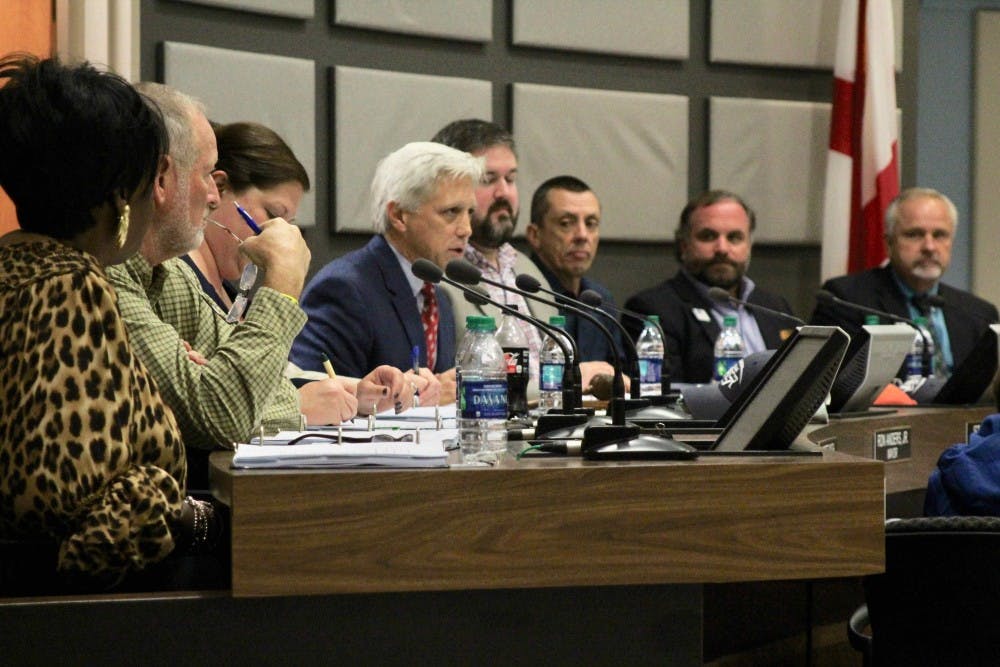The newly elected Auburn City Council got straight into the thick of things at their first Council meeting Thursday night over a single proposed road that is largely out of the Council’s control.
The Council passed a rezoning ordinance for property in the Riverwood area that has sparked controversy over a potential connector road being built leading out of the neighborhood in order to improve traffic flow.
The ordinance rezones an approximately 10-acre property between Riverwood Drive and Champions Boulevard from rural to development district housing, where the developer plans to build residential homes. While not directly linked, the City Planning Commission is considering approving a connector road along with the rezoning that would connect the Moores Mill Road area with the Bent Creek area. The road would join Riverwood Drive and Champions Boulevard.
Residents of the Riverwood and Moores Mill areas have voiced their opposition to the potential connector road due to safety and traffic concerns.
The rezoning ordinance does not itself authorize a connector road, and the City Council does not have authority to decide on the road. However, seven residents addressed the Council Tuesday night with their worries.
“It’s our position that Riverwood Drive is clearly not built to accommodate the significant increase in traffic flow that we believe will result from this connection,” said citizen David Ericson, who lives on Riverwood Drive.
Residents said there are no sidewalks in the area, people frequently park on the street, and traffic is already somewhat dangerous in the neighborhood. Increased traffic resulting from a connector road would pose even greater risks to residents, the citizens said, for reasons such as these.
“I have to drive extremely carefully, extremely slowly down our street as it is,” said Amy Greene, who got emotional as she voiced concerns over safety for children in the community. “I don’t understand how anyone who’s ever seen our street can possibly think that the benefits of connectivity outweigh the risks to our children in this neighborhood.”
Other citizens had an issue with new homes being built if the rezoning ordinance was passed, voicing concerns over the lot sizes and increased traffic that would come from more residents.
Ericson said the community feels that their concerns are “falling on deaf ears,” and although they have talked to city officials and planning commission members, they have yet to receive “any information that addresses or alleviates any of these safety concerns.”
Forrest Cotten, the city planning director, said connectivity is a common issue, and it’s rare to forgo connector roads in subdivisions as they develop.
“It’s also going to be a very rare occasion that you propose a connection and anybody around the connection is going to like it,” Cotten said.
The city is proposing the connector in order to improve traffic flow from the Moores Mill area to the Bent Creek area.
“The more connections we have, the better off we are, the more the trips are distributed, the better off everybody is,” said Cotten.
Cotten said that a lack of connector roads results in “incredibly clogged arterials, because that’s the only place you’ve left for that traffic to go. So it’s a tradeoff.”
City Manager Jim Buston said the city’s master street plan has anticipated for almost 20 years some form of connectivity from the Moores Mill area to the Bent Creek area.
“But… that doesn’t mean it has to happen,” Buston said. “The Planning Commission may say yes, they may say no.”
Ward 8 Councilmember Tommy Dawson opposed the road, saying he thought it would be too dangerous for neighborhood residents with cars coming off the interstate and driving through the connector. He was also concerned about public safety from a crime perspective.
“If I had my own way, every neighborhood in Auburn would be one way in and one way out, because that cuts down tremendously on burglaries,” Dawson said.
Buston said that while burglary issues are a problem with greater connectivity, having multiple ways in and out of a neighborhood is good in the case of a disaster where emergency vehicles need to get in and residents need to evacuate.
Ward 5 Councilmember Steven Dixon and Ward 6 Councilmember Bob Parsons also said they did not support the connector road.
Parsons said it would be frustrating for citizens to voice their concerns and feel like they were not being listened to, an issue that he said has been ongoing in Auburn.
Mayor Ron Anders said he supports the rezoning ordinance, but not the connector road.
“This neighborhood does not want connectivity,” Anders said. “I would hope that the planning commission would not vote in that direction.”
Buston said he would make sure the planning commission was aware of the Council’s concerns over the connectivity issue.
The City Planning Commission will decide whether or not to move forward with the connector road on Thursday, Nov. 8.
The Council approved the rezoning request in a 7-2 vote, with Parsons and Ward 2 Councilmember Kelley Griswold voting against the ordinance.
The rezoning ordinance was originally introduced at the Oct. 16 meeting where it was tabled after Councilmember Beth Witten denied the unanimous consent required to approve the request. Several citizens also addressed the Council about the connector road at the Oct. 16 meeting.
Anders' new task forces
At the start of the night, Anders said he plans to make some changes to the city council, starting with how the council meetings are conducted.
“The heart of the matter is, we’re going to try to make our meetings more efficient, more respectful, but still allow our community all the opportunity they need to speak to what’s going on here in the city,” he said. “But it will be structured a little bit differently.”
Anders did not elaborate further on how the meetings will be different, but said the procedures will go into effect at the next meeting on Nov. 20.
Anders said he plans to initiate four task forces immediately, with two council members appointed to lead each one.
The first is for student housing.
“It’s my belief this is an area of great concern to me personally and to many people in the community,” he said, adding that he’ll be asking Auburn University, the city staff and the Planning Commission to participate in this issue as well.
The second concerns diversity in Auburn.
“It is time for us to make sure as a community that we have no holes in our community,” Anders said.
The third will address vacation rentals.
“The time has come I believe for the city to have a philosophy and have a policy in place,” Anders said of vacation rentals. Anders said he plans to hold public meetings to hear both sides of the story surrounding this issue.
The fourth and final task force is charged with evaluating the processes for selecting boards and commissions positions.
“It’s a fresh time to get a fresh look at how we go about determining the good people who give up their time to help serve all of us on behalf of this community,” Anders said. The task force will determine if they need to make changes to the boards and commissions selection process, Anders said, adding that some of the positions may warrant an interview process.
Do you like this story? The Plainsman doesn't accept money from tuition or student fees, and we don't charge a subscription fee. But you can donate to support The Plainsman.





